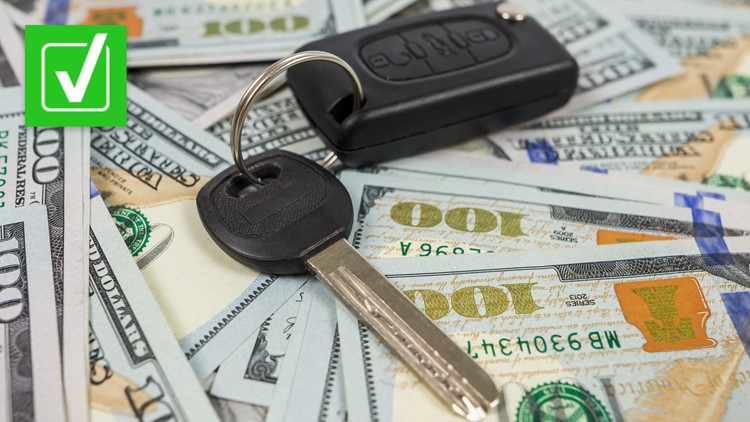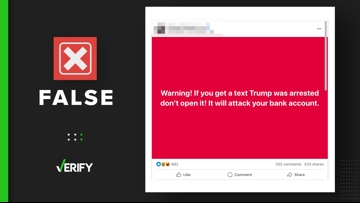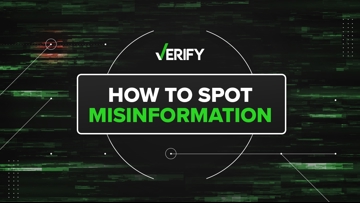Car owners — particularly after a new purchase — will sometimes receive calls and notices in the mail warning that the manufacturer's warranty on their car is ending and they need to purchase an extended warranty.
That’s the kind of notice one VERIFY reader recently received. Wesley asked us if the “Motor Vehicle Services Notice” he got after buying his car is legit.
THE QUESTION
Are unsolicited calls and letters about extending expiring car warranties scams?
THE SOURCES
THE ANSWER
Yes, unsolicited calls and letters about extending expiring car warranties are scams.
WHAT WE FOUND
Motor vehicle service contract scams, more commonly known as extended auto warranty scams, try to trick you into buying a worthless contract. The contract’s terms will make it difficult or impossible to actually get coverage for your vehicle, or the scammer will simply take your money and run.
New cars often come with a factory warranty from the car manufacturer that promises to cover maintenance and repairs for your car for a set period of time. You don’t have to pay for these warranties because they come with your car purchase, the Office of Minnesota Attorney General Keith Ellison says.
No one can extend that warranty but the car manufacturer itself, the AARP says. When you get an “extended auto warranty,” you’re paying someone for a new service contract that won’t give you the same level of coverage for car repairs and maintenance as the original factory warranty, even if the contract is from a legitimate company, the Federal Trade Commission (FTC) says.
You can get actual coverage from service contracts from legitimate companies. But those companies won’t promise they can extend your vehicle’s expiring factory warranty, and they won’t pressure you with phone calls and postcards to sign a contract you haven’t read. Companies that do those things are scammers.
Extended car warranty scammers try to contact you at home — over the phone, by text message, on social media platforms, at your door and through the mail, the Government of the District of Columbia Department of Insurance, Securities and Banking (DISB) says.
The scammers want to pressure you into purchasing their “warranty” without ever reading a contract, the FTC says. To accomplish this, they’ll use phrases such as “Motor Vehicle Notification,” “Final Warranty Notice” and “Notice of Interruption” to make the notice seem urgent.
They’ll likely tell you your vehicle’s factory warranty is expiring. Whether it’s true doesn’t actually matter; they can get you to sign up and pay for one of their contracts even if your factory warranty is still active.
These urgent messages also usually contain the year, make and model of your vehicle, and sometimes even its VIN, the AARP says. That’s all public information scammers can find from state motor vehicle records or by purchasing it through data-collection companies, so it’s not a sign you’re dealing with someone trustworthy.
Extended warranty scammers will often spoof their caller ID, another attempt to appear more believable, DISB says. This is a trick where they edit their caller ID information to make it look like the call is coming from a local number or even from someone trustworthy like your car manufacturer or state DMV office. If you pick up the phone and respond to any instructions — like pressing a button or confirming you can hear someone — the scammers know your phone number is active and will keep trying to call you.
If you do end up talking to a real person, the scammer will try to pressure you into giving away personal financial information and agreeing to a down payment right away, before you actually get to know any details about the service contract, the FTC says.
And once the scammer has your money, they don’t intend to make good on their promises. Sometimes, the FTC says, they’ll avoid giving you coverage by simply going out of business before you need it. Other times, they’ll bury countless restrictions and loopholes in the contract that prevent you from ever qualifying for coverage.
You should never pay for a contract you haven’t read, the Minnesota Attorney General office says. Reputable companies will allow you to read the details of a contract before taking your money, so insisting they show you a contract is a good first step to identifying a scammer.
Carefully reading the terms can save you from a bad extended warranty contract, scam or not. Extended warranty contracts usually have specific conditions for coverage, whether they make those conditions obvious or bury them in fine print, the FTC and Minnesota Attorney General office says.
“Make sure you understand what is and isn’t covered, and how claims are reimbursed, before you buy,” the AARP says. “If you are interested in a plan, approach the provider directly. Any unsolicited warranty offer is almost certainly a scam.”
And just like with anything else, never give out your personal details or payment information over the phone to an unsolicited caller you haven’t confirmed the identity of or haven’t dealt with previously.
Whether you’re a victim or just a target, you should report all extended warranty scams to the FTC and your state’s attorney general office. If the scammer contacted you by phone, you can also report the call to the Federal Communications Commission (FCC).
Your state’s attorney general office might even be able to help you cancel the contract and possibly even a refund for it. Some states, like Minnesota, require these contracts to be refundable for a certain period of time.
A search for “extended warranty scam” on the Better Business Bureau’s website shows countless motor vehicle service contract companies that spam consumers, don’t provide adequate coverage and/or make it difficult or impossible to cancel or refund the contracts.













